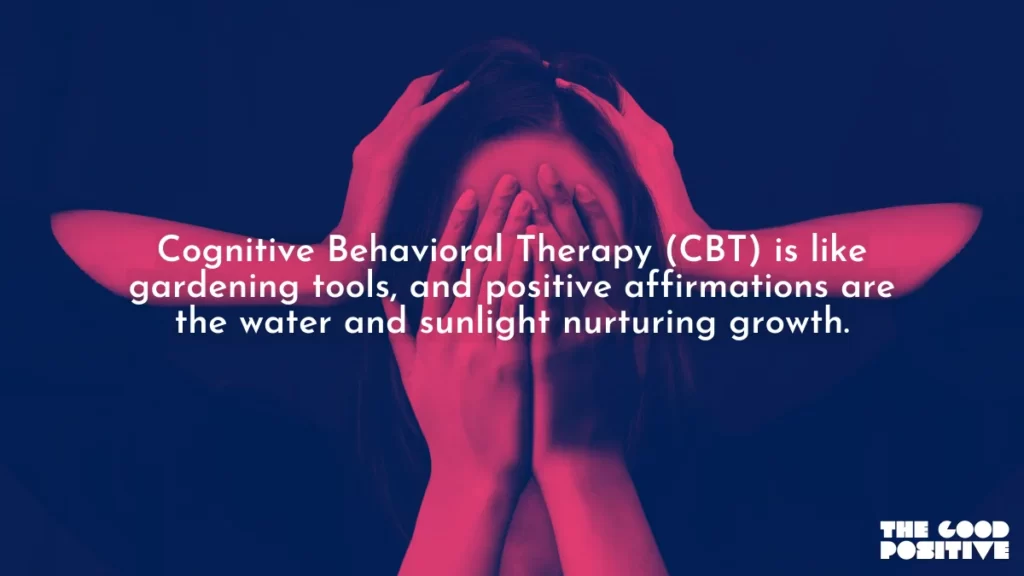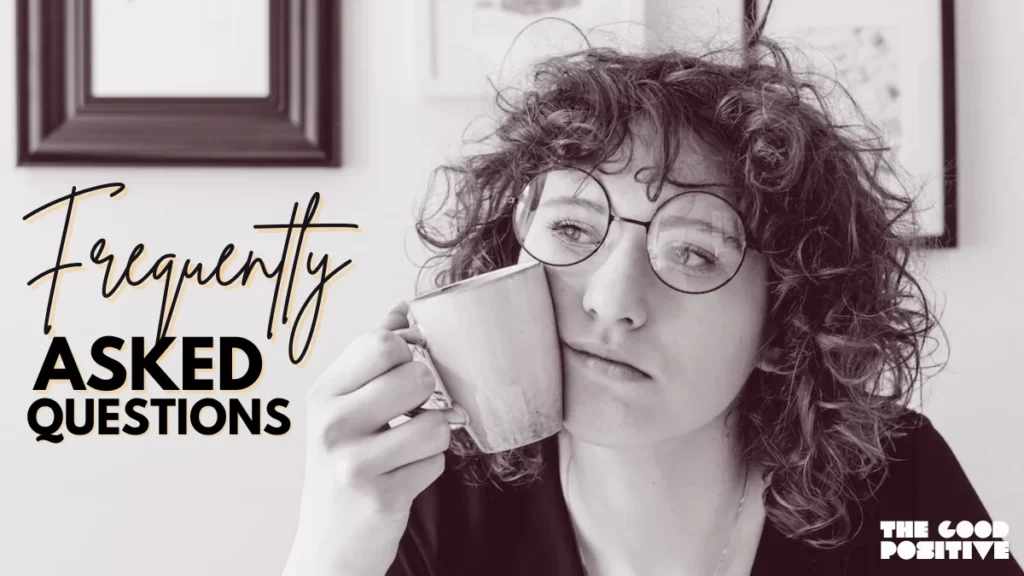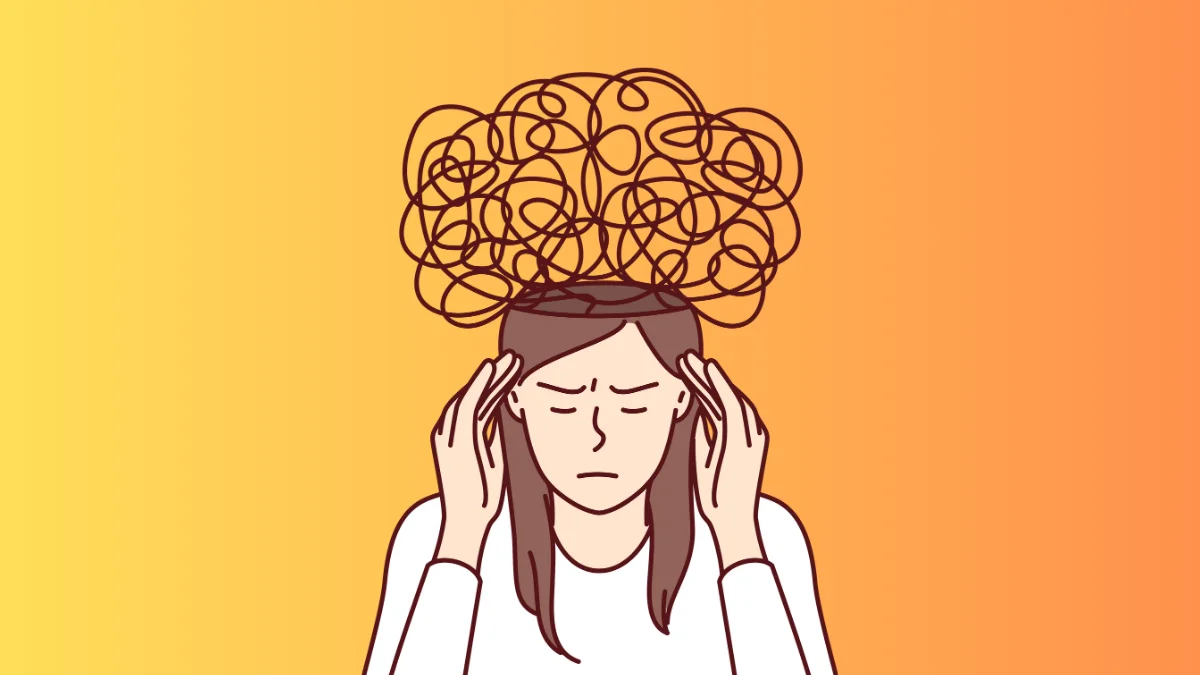Positive Affirmations For CBT: Imagine embarking on a journey where each step forward is guided by the power of your own words. That’s the transformative magic of positive affirmations in Cognitive Behavioral Therapy (CBT).
I’ve traversed this path, discovering how affirmations can rewire thoughts and foster resilience. Now, I want to share this treasure with you.
Picture affirmations as your personal cheerleaders, chanting in the rhythm of positivity, making each day a victory over doubts and fears.
With ‘100 Positive CBT Affirmations‘, we’ll explore how these simple yet powerful statements can be your beacon of light, guiding you to a mindset where challenges become stepping stones to a happier, healthier you.
Let’s start this journey together, affirming our way to a brighter tomorrow.
Table of Contents
Affirm More: Positive Affirmations For Call Center.
Why Use Positive Affirmations For CBT?

Picture a garden – your mind – where each thought is a seed that blossoms into your reality.
Cognitive Behavioral Therapy (CBT) is like gardening tools, and positive affirmations are the water and sunlight nurturing growth.
Here’s why they’re a big boon in CBT:
1. Rewiring the Brain: Just like how a musician masters an instrument through practice, affirmations rewire your brain. Remember Thomas Edison? Each failure in his experiments was a step closer to success. He affirmed his belief in progress, reshaping his reality.
2. Boosting Self-Esteem: Imagine a friend constantly cheering for you. That’s what affirmations do. They’re your own personal cheerleader, building a fortress of self-esteem. Think of Eleanor Roosevelt – “No one can make you feel inferior without your consent.” She lived her affirmations.
3. Overcoming Negativity: Affirmations act as shields against life’s arrows of negativity. When Neil Armstrong set foot on the moon, he didn’t just walk on a celestial body; he walked on his affirmations, a testament to overcoming doubts with positive belief.
4. Creating a Positive Outlook: Affirmations are like lenses tinted with optimism. They help you see challenges not as mountains blocking the sun, but as summits waiting to be conquered.
So, as you embark on your CBT journey, let positive affirmations be the compass that guides you through the forest of your mind, turning every stumbling block into a stepping stone.
100 Positive Affirmations For CBT (Cognitive Behavioral Therapy)

Imagine you’re holding a key, a special one that unlocks the vast potential of your mind. That’s what I’m offering you today with “100 Positive CBT Affirmations.”
Picture us sitting together, sipping our favorite drinks, as I share with you these affirmations, each one a stepping stone towards a more resilient, joyful you.
These aren’t just words; they’re seeds planted in the fertile soil of your mind, ready to bloom.
🔖 Bookmark this page, and let’s embark on a 21-day journey together. Recite these affirmations daily, and watch as they transform your thoughts, bringing a refreshing clarity and strength to your everyday life.
Ready? Let’s begin this beautiful adventure.
1. “I embrace CBT as a path to positive change.”
2. “My thoughts are under my control with cognitive behavior therapy.”
3. “I choose to focus on positive feelings and actions.”
4. “Every CBT session helps me understand my sensations better.”
5. “I am transforming negative thoughts into constructive ones.”
6. “CBT guides me in managing my mental health effectively.”
7. “I am capable of overcoming depression through therapy.”
8. “My anxiety is being addressed with each CBT practice.”
9. “I use cognitive behavior techniques to handle stress.”
10. “I am gaining strength to tackle my disorders daily.”
11. “CBT is a powerful tool in my treatment plan.”
12. “My therapy sessions are stepping stones to wellness.”
13. “I am learning to communicate my feelings better.”
14. “Each day, I apply CBT strategies to improve my life.”
15. “I am in control of my reactions and emotions.”
16. “CBT empowers me to break free from chronic pain.”
17. “My sleep improves as I practice CBT for insomnia.”
18. “I acknowledge my problems and work towards solutions.”
19. “I am proactive in my cognitive behavioral therapy.”
20. “I value the benefits of counseling for my well-being.”
21. “I am committed to my mental health activities.”
22. “My therapist’s guidance is a beacon of hope.”
23. “I am part of a supportive group in therapy.”
24. “I take charge of my life with CBT techniques.”
25. “My mental health journey is positive and enlightening.”
26. “I am building a healthier mindset with each session.”
27. “I let go of harmful thoughts through CBT.”
28. “CBT helps me maintain balance in my life.”
29. “I find relief from stress through therapy.”
30. “My actions reflect the positive changes from CBT.”
31. “I am becoming a stronger version of myself.”
32. “CBT is a key part of my daily routine.”
33. “I face challenges with a positive, therapeutic approach.”
34. “I am overcoming my fears with CBT.”
35. “I see progress in my mental health journey.”
36. “CBT is my ally in combating negative emotions.”
37. “I am guided towards a healthier mental state.”
38. “My confidence grows with each therapy session.”
39. “I trust my therapist to lead me to recovery.”
40. “I find strength in talking about my feelings.”
41. “CBT gives me tools to handle life’s pressures.”
42. “I am mastering my emotions with cognitive strategies.”
43. “Every CBT session brings me closer to peace.”
44. “I am capable of managing my mental wellness.”
45. “I embrace the healing power of CBT.”
46. “My journey with therapy is transformative.”
47. “I prioritize my health through regular sessions.”
48. “CBT helps me navigate life’s complexities.”
49. “I am empowered to make positive life changes.”
50. “My therapy experience is enriching my life.”
51. “I am patient with my progress in CBT.”
52. “CBT is helping me rebuild a positive outlook.”
53. “I trust the process of cognitive behavioral therapy.”
54. “I am committed to improving my mental state.”
55. “I find comfort in the structure of CBT.”
56. “My therapy sessions are a safe space for growth.”
57. “I am learning to manage my physical sensations.”
58. “CBT teaches me resilience against life’s challenges.”
59. “I am discovering new ways to express myself.”
60. “My mental health is a priority in my life.”
61. “I am grateful for the support of my therapist.”
62. “CBT is a journey of self-discovery and healing.”
63. “I am learning to cope with life’s stresses.”
64. “I am proud of my commitment to therapy.”
65. “CBT is shaping me into a better individual.”
66. “I find peace in practicing CBT techniques.”
67. “My therapy sessions are a source of clarity.”
68. “I am making meaningful progress in therapy.”
69. “CBT helps me understand and control my reactions.”
70. “I am gaining insight into my mental patterns.”
71. “I embrace the challenges in my therapeutic journey.”
72. “I am growing stronger with each therapy session.”
73. “CBT is a valuable tool in my life.”
74. “I am creating a positive mental environment.”
75. “My therapy is an important part of my routine.”
76. “I find joy in the progress I make in CBT.”
77. “I am learning to let go of unhelpful thoughts.”
78. “CBT guides me towards a healthier mental state.”
79. “I am dedicated to improving through therapy.”
80. “My CBT sessions are milestones in my journey.”
81. “I am more aware of my mental health needs.”
82. “CBT is helping me build a stronger future.”
83. “I trust in the process of healing through therapy.”
84. “I am embracing the change that CBT brings.”
85. “My mental health is improving with each session.”
86. “I am finding balance with cognitive behavioral techniques.”
87. “I am grateful for the guidance of my specialist.”
88. “CBT has become a positive force in my life.”
89. “I am learning to navigate my emotions wisely.”
90. “My therapy sessions are full of valuable insights.”
91. “I am committed to a healthier mental lifestyle.”
92. “CBT helps me tackle life’s challenges with grace.”
93. “I am building a foundation of positive thoughts.”
94. “I am embracing the journey of cognitive therapy.”
95. “My sessions are a step towards mental freedom.”
96. “I am gaining control over my anxiety and depression.”
97. “CBT is a path to understanding myself better.”
98. “I am creating a brighter future with therapy.”
99. “My mental health is nurtured through CBT.”
100. “I am proud of the strides I make in therapy.”
How to Use Positive Affirmations for CBT?

Imagine you’re a sculptor, and your thoughts are the clay.
Positive affirmations in Cognitive Behavioral Therapy (CBT) are your tools to shape this clay into a masterpiece.
Let’s dive into how you can wield these tools effectively:
#1. Identify Limiting Beliefs: Start by listening to your inner dialogue. Is it a friend or a critic? For me, realizing that my own thoughts often echoed past criticisms was a revelation. Identify these negative beliefs – they’re the raw material for your affirmations.
#2. Craft Your Affirmations: Turn each limiting belief into a positive statement. If you often think, “I can’t handle this,” transform it into “I am capable and strong.” Remember, affirmations are like seeds of hope; plant them carefully.
#3. Integration into Daily Routine: Integrate affirmations into your daily life. Place them where you’ll see them – on your mirror, in your wallet, or as a phone wallpaper. Let them be the first thing you see in the morning and the last at night.
#4. Mindful Repetition: Like a favorite song, let these affirmations play in your mind. Repeat them mindfully, not just as a chorus but feeling each word. When you’re stuck in traffic, instead of frustration, fill that time with your affirmations.
#5. Reflect and Adjust: Regularly reflect on your affirmations. Are they still relevant? As you grow, your affirmations should evolve too. It’s like updating your wardrobe – keep what fits your current self.
How to Write Affirmations for CBT?
Writing effective affirmations is an art. Here’s how to make each word count:
- Be Specific: Vague affirmations are like blurry pictures. Be as specific as possible.
- Use Present Tense: Affirmations are about now, not tomorrow. “I am,” not “I will be.”
- Incorporate Emotion: Let each affirmation resonate with how you want to feel.
By following these steps, you’re not just using affirmations; you’re embarking on a journey of transforming your thoughts, one positive statement at a time.
Remember, in the gallery of your mind, you are both the artist and the masterpiece.
FAQ’s

-
Does CBT use positive affirmations?
Absolutely! CBT (Cognitive Behavioral Therapy) often incorporates positive affirmations as a tool to challenge and neutralize negative thoughts. It’s like giving your brain a new, healthier script to follow, helping to reshape thinking patterns towards more positive outcomes.
-
How do you use positive affirmations in therapy?
In therapy, positive affirmations are used as a kind of mental exercise. You repeat these affirmations, especially in moments of stress or negative thinking, to redirect your mind towards positive beliefs. It’s like planting seeds of positivity in your garden of thoughts!
-
What is affirmation in psychotherapy?
In psychotherapy, an affirmation is a positive statement that is repeated to encourage and uplift the individual. These affirmations are tailored to combat negative thoughts and beliefs, and to reinforce the therapy’s objectives. Think of them as gentle, yet powerful reminders of your worth and potential.
-
What is the psychology of positive affirmations?
The psychology behind positive affirmations is fascinating. They work by gradually replacing negative thought patterns with positive ones. This process, known as cognitive restructuring, can actually change the way your brain works, helping you to view yourself and the world more positively.
-
What are some good positive affirmations?
Some great positive affirmations include: “I am capable and strong,” “I choose to focus on what I can control,” and “I deserve happiness and peace.” These simple yet powerful statements can really help to shift your mindset and improve your overall well-being.
-
How to use affirmations for manifestation?
To use affirmations for manifestation, you need to choose statements that align closely with your goals and desires. Repeat them regularly, and importantly, visualize and believe in the outcome. It’s like setting your GPS to your desired destination with confidence and clarity.
-
How to give positive affirmations to others?
When giving positive affirmations to others, it’s key to be genuine and specific. Focus on their strengths and achievements. For example, say, “I’ve noticed how hard you’ve worked on this project, and your dedication really shows in the results.” This approach not only boosts morale but also reinforces their positive traits.
-
What are positive affirmations in the context of Cognitive Behavioral Therapy (CBT)?
In CBT, positive affirmations are used as a technique to counteract negative and often irrational thoughts. They serve as constructive self-statements that promote self-compassion and positive thinking, aiding in the reshaping of unhelpful thought patterns.
-
How do affirmations enhance the effectiveness of CBT?
Affirmations in CBT act like mental strength training. By repeatedly affirming positive thoughts, you’re essentially reprogramming your brain to focus on positive aspects and possibilities. This helps in breaking the cycle of negative thought patterns, making CBT more effective in altering harmful cognitive habits.
-
Can positive affirmations help in reducing anxiety and depression through CBT?
Yes, positive affirmations can be quite effective in reducing symptoms of anxiety and depression when used as part of CBT. They help shift focus away from distressing thoughts and towards more balanced, positive perspectives, which is crucial in managing these conditions.
-
What role do affirmations play in cognitive restructuring in CBT?
In cognitive restructuring, a key element of CBT, affirmations play the role of helpful tools to challenge and change negative, dysfunctional thoughts. By actively using positive affirmations, individuals can develop healthier, more adaptive thought patterns, contributing to improved emotional regulation and behavior.
-
How often should I practice positive affirmations for CBT to be effective?
Consistency is key! Practicing positive affirmations daily, ideally multiple times a day, can significantly enhance their effectiveness in CBT. It’s like building a muscle; the more you exercise it, the stronger it becomes. Over time, these positive affirmations will become a natural part of your thought process.
-
Are there specific positive affirmations recommended for CBT patients?
Yes, CBT patients often benefit from affirmations tailored to their specific challenges. For instance, someone struggling with anxiety might use, “I am calm and in control,” while someone with low self-esteem might affirm, “I am worthy and capable.”
-
How can I create effective affirmations for my CBT sessions?
To create effective affirmations for CBT, identify your negative thought patterns first. Then, craft affirmations that directly counter these thoughts. For example, if you often feel incompetent, use an affirmation like, “I am skilled and capable.” Keep them positive, present tense, and believable.
-
What is the impact of positive affirmations on mental health in CBT?
Positive affirmations in CBT can significantly boost mental health by reframing negative thought patterns. They encourage a more optimistic outlook and help in developing resilience against stress and anxiety. This leads to an improved mood and better coping strategies
-
Can positive affirmations replace therapy sessions in CBT?
While positive affirmations are beneficial, they cannot replace therapy sessions in CBT. They are complementary tools used alongside professional guidance. Therapy provides a structured approach to understanding and changing thought patterns, which affirmations alone cannot fully address.
-
How do positive affirmations aid in overcoming negative thoughts in CBT?
Positive affirmations in CBT help by providing an alternative narrative to negative thoughts. Regularly repeating these affirmations gradually weakens the hold of negative beliefs and replaces them with a more positive mindset, aiding in cognitive restructuring.
-
What are some positive affirmations in counseling?
“I am open to growth and learning from my experiences.”
“I am deserving of understanding and compassion.”
“Each counseling session brings me closer to healing.”
“I am capable of overcoming my challenges.” -
What are some positive affirmations for self-help?
“I have the power to change my story.”
“Every day, in every way, I am getting stronger.”
“I am worthy of happiness and fulfillment.”
“I trust my journey and embrace my growth.” -
What are some positive affirmations in therapy?
“I am making progress, one step at a time.”
“I am learning valuable skills to improve my life.”
“My feelings are valid and I am heard.”
“I am building a healthier, happier future for myself.”
Conclusion
As we close this chapter on positive affirmations for CBT (Cognitive Behavioral Therapy), picture yourself standing at the edge of a new dawn.
These affirmations aren’t just words; they’re the gentle nudge you need on days when the world seems a bit too heavy.
I wrote this article to hand you a lantern in the dark, to remind you that your thoughts have the power to light up the path ahead. It’s life-changing because each affirmation is a step towards the you that smiles more, loves more, and lives more.
So, as you step into your world today, carry these affirmations in your heart. Remember, you’re not just repeating words; you’re sculpting your reality.
Keep that smile, because you, my friend, are on a journey to a brighter, more positive you!
Affirm More: Positive Affirmations For Cesarean.

Aldvin is the proud owner of “thegoodpositive.com.” A passionate writer and supporter of body positivity. Advocate of plus-size fashion. He’s mission is to curate the latest trends and timeless fashion for plus size women. He wants to inspire confidence and creativity through fashion, helping curvy women express their unique personalities with every outfit.

